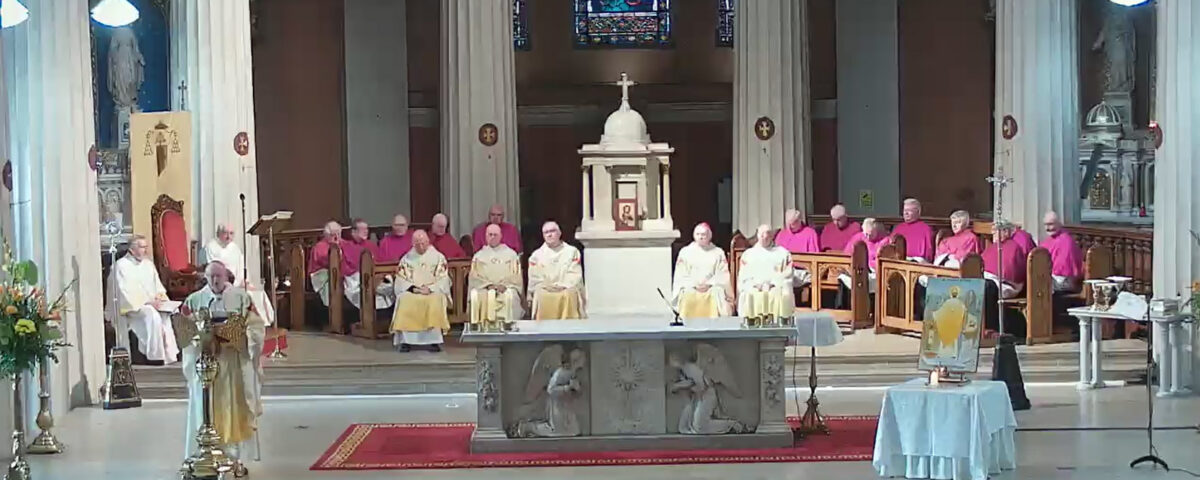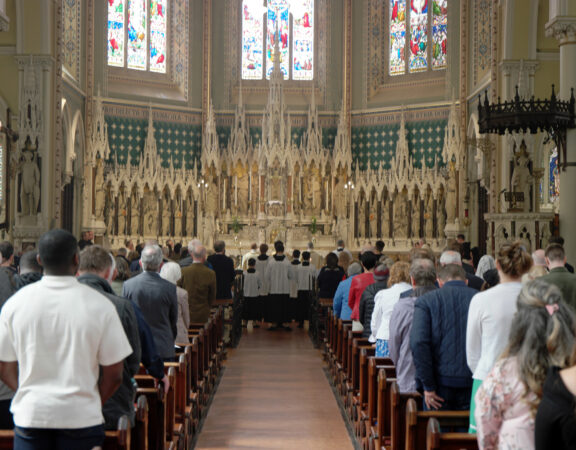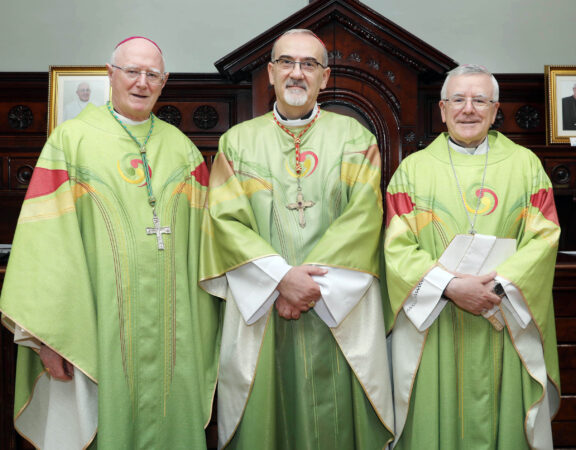Feast of St Laurence O’Toole
Homily of Archbishop Dermot Farrell
Tuesday, November 14, 2023
St Mary’s Pro-Cathedral, 10.30 am
In celebrating the feast of the patron of our diocese, we give thanks to God for the graces bestowed on St Laurence O’Toole in his life, and for the gift of his witness for us today. Beyond the understandable historical patina, there is something exceptional and extraordinary in the contours of his life: Abbot of Glendalough at 25, first Irish Archbishop of Dublin in his early 30s, respected and trusted by the Irish, the Vikings and the Normans alike, a skilled mediator and peacemaker, revered by the community of Eu in Normandy where he died.
Laurence lived at a time of great social and demographic change. The established institutions of influence and authority were being radically disrupted. Clashes of language and culture were pervasive. Deeply rooted in the Gaelic tradition, Laurence is portrayed as finding the capacity to be open to encounter with the new and different. He created in his diocese a tent wide enough to accommodate differing traditions, insights and priorities.
The witness of Laurence in a time of vast change is a call to us in our time too. Laurence, and his Church, found ways to negotiate the change that they had to undertake. However, facile parallels will not bring us far; in fact, may even be counterproductive. Twelfth century Dublin is not 21st century Dublin! We cannot simply mirror the 12th century—with its medieval structures, its violence, its patriarchy, and its hierarchies. We have to do something else. Even in our weakness, we still have to act; and we have to find ways of permitting our Lord to act in us and among us.
The call of Pope St John XXIII that resulted in the Second Vatican Council, was a call to respond to a world that had radically changed in the preceding 100 years. Europe and the world had changed radically from the late 1840s to the late 1940s—constant social upheaval, the rise of radical revolutionary nationalism, three major wars, and the arrival of technologies promised not only prosperity but also unprecedented destruction. In his pastoral heart, Pope John knew that the Church had to respond in new ways to the changed world. The Second Vatican Council was the beginning of that response, and the response continues, and must continue, because the world and the context of the people we are called to serve, continue to change, and change profoundly.
Last month’s Synod was but the most recent phase of the response that began in the Second Vatican Council. While its process has rightly emphasised the importance of listening to the voices of those not often heard in, or even repelled by church, this is not the totality of the synodal process. Not only good theology, but also common sense, would tell us that we need to find ways of listening to the voices of all whose faith commitment is deeper—both ordained and lay, especially women in the attempt “to support a fruitful dialogue between the many charisms and ministries at the service of the coming of the Kingdom.”
I think the way the synodal assembly unfolded was a surprise both to the participants and to those observing. Pope Francis risked a genuinely new way, with himself listening at tables, with the inclusion of laity with voting rights, the curtailment of sensational daily communications on hot-button issues, and the constant interlacing of prayer and what the process called “spiritual conversation”—a way of putting authentic listening into practice. It is clear there were convergences, divergences, tensions and questions. While we do not know what the Church in Dublin will look like in ten years’ time, the synodal way gives me hope. In particular, I was given hope by the following:
(i) The whole experience was grounded in prayer. While, all issues, including disputed ones were up for discussion, the real question was, where was the Spirit moving? Such a question cannot be answered outside of the Spirit, outside of genuine prayer-filled listening.
(iii) Secondly, this phase of the Synod was about how we talk to one another and perhaps more crucially how we listen to one another. As one Synod participant perceptively remarked, “the process itself [was and] is, in a sense, a laboratory to help us all learn to listen.” (see Catherine Clifford in America, November 8, 2023)
(iii) Thirdly, the participation of all the baptised including young people and women in a way that allowed them to participate authentically in decision-making processes and assume roles of responsibility in pastoral care and ministry was labelled urgent. Significantly, this was a recommendation designated as urgent. That tells us a great deal.
(iv) Lastly, I was struck by how it was evident throughout the synodal discussions that doctrine was at the service of the pastoral ministry of the Church. Timothy Radcliffe OP, former Master of the Dominicans, captured it well: “What will be given?” he asked, “We wait to see what the Lord in his wisdom will give us, which will certainly not be what we expect.”
It would be easy to feel overwhelmed by the scale of the changes and challenges which we face. It is true that the model of Church with which most of us grew up, and for which we were formed, is—in one sense—collapsing around us. The demands and expectations of clergy and those in ministry continue to increase, while the numbers in active ministry decline. Things are changing, and while change is not uniform, and has a way to go, partnership is providing an impetus for pastoral and Church development.
Parishes and partnerships are called to express community in new ways. This means listening to the people with whom we form community. We cannot hear others well, however, unless we are listening to ourselves, to our own hearts, which again brings us into an intimate dialogue with God. Listening is at the very heart of the synodal process—listening to each other, listening to ourselves, listening to and for the Lord. That means we have to risk what Pope Francis risks: risking the move from “top-down” communication to the communication among those who are travelling with each other on the one road, people journeying together after their Lord (Matt 4:19–20). This will bear fruit. To paraphrase Timothy Radcliffe, not the fruit we expect, but the fruit the Lord gives. Nobody knows how this will pan out, but our Lord will not be found wanting. As it says in the psalm, “he opens wide his hand, and grants the desires of all who live.” (Psalm 144 (145): 16)
We know that the mission with which we are entrusted does not depend on our own capacity or worth. If it did, we would long since have succumbed to challenges without, and weaknesses within. We build on sure foundations; indeed, the cornerstone will not fail. We can see in the willingness of the three candidates offering themselves this morning for service on the path to ordination as deacons, a sign of the Spirit that moves hearts in the service of the Kingdom through ministry in the Church.
Inspired by the example of St Laurence and confident that the divine life which sustained him is also at work in our lives, we renew our commitment to the service of the people of this diocese, that they may recognise the hand of God at work in their lives, and the fullness of life God desires for all that he has created.
+Dermot Farrell
Archbishop of Dublin







